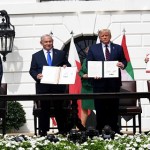On February 18, 2021, Gateway House co-hosted a webinar with Konrad-Adenauer-Stiftung on Realignments in West Asia. The panel included Ambassador Navdeep Suri, Principal Economic Advisor, Distinguished Fellow and Director of the Centre for New Economic Diplomacy, Observer Research Foundation, New Delhi; and Professor Efraim Inbar, President, Jerusalem Institute for Strategy and Security.
The virtual Panel Discussion (18 February 2021) on “Realignments in West Asia” was intended to discuss the recent sweeping geopolitical developments in the region and how should India respond to these changes. The discussion revolved around three key themes: the Abraham and Al-Ula accords; Biden administration’s West Asia policy; and India’s policy options.
- Abraham and Al-Ula accords: The Abraham Accords lend religious legitimacy to the state of Israel. They are a historical step towards combating anti-Semitism as they counter the widespread notion in the Arab world that Israel is the creation of the colonialist powers. The Al-Ula accord materialised due to the push from the Trump administration as the Arab Quartet’s (Saudi-Arabia, UAE, Bahrain and Egypt) blockade on Qatar did not yield the desired result.
- Biden administration’s West Asia policy: President Biden will have a different West Asia policy from his predecessors. It will retain some elements of President Trump’s policy, such as retaining the U.S. embassy in Jerusalem and building on the Abraham and Al-Ula accords. On Iran, the U.S. policy will change as Biden will seek to bring Tehran to the negotiation table. It is difficult to say whether he will succeed: Israel cannot tolerate enhanced Iranian nuclear capabilities and Arab states, too, found the earlier Joint Comprehensive Plan of Action problematic because it encouraged Iranian efforts to create a ‘Shia crescent’ to encircle them.
- India’s West Asia policy: In recent years, India has prioritised relations with Israel, Saudi Arabia and UAE under its ‘Look West’ policy. The strategic partnership with UAE and Saudi Arabia has brought rewards in political, economic and energy spheres. On Iran, any potential easing of the U.S. sanctions will benefit India as it will be able to resume relatively normal bilateral trade. On the security front, India has taken on more responsibilities in the maritime domain rather than free-riding. The condition of the Indian diaspora has improved over the last 5-6 years. India has worked with many governments in the region to provide better protection to its workers.
- Country perspectives – Role of other regional players:
- A prospering economy and a capable military have enabled the UAE to take on a greater share of regional responsibility. It has also emerged as a vanguard against religious and fundamental extremism and prioritised tolerance with other faiths.
- Turkey, can be a balancing power against Iran, but its behaviour is destructive. In some aspects, such as trade and commerce, President Erdogan has adopted a pragmatic policy.
- Egypt, which was once central to the Arab world, has lost its status after the failed Arab Spring. Today, Saudi Arabia and UAE have taken the lead in setting the region’s direction. A case in point was Qatar’s boycott, which was decided upon by Riyadh and Abu Dhabi, and Cairo merely implemented it.
For interview requests, or for permission to republish, please contact outreach@gatewayhouse.in
© Copyright 2021 Gateway House: Indian Council on Global Relations. All rights reserved. Any unauthorised copying or reproduction is strictly prohibited.


